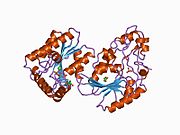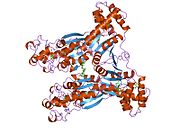Protein-coding gene in the species Homo sapiens
| PFKFB4 |
|---|
 |
| Identifiers |
|---|
| Aliases | PFKFB4, 6-phosphofructo-2-kinase/fructose-2,6-biphosphatase 4 |
|---|
| External IDs | OMIM: 605320 MGI: 2687284 HomoloGene: 48288 GeneCards: PFKFB4 |
|---|
| Gene location (Human) |
|---|
 | | Chr. | Chromosome 3 (human)[1] |
|---|
| | Band | 3p21.31 | Start | 48,517,684 bp[1] |
|---|
| End | 48,562,015 bp[1] |
|---|
|
| Gene location (Mouse) |
|---|
 | | Chr. | Chromosome 9 (mouse)[2] |
|---|
| | Band | 9|9 F2 | Start | 108,820,846 bp[2] |
|---|
| End | 108,861,296 bp[2] |
|---|
|
| RNA expression pattern |
|---|
| Bgee | | Human | Mouse (ortholog) |
|---|
| Top expressed in | - blood
- monocyte
- stromal cell of endometrium
- jejunal mucosa
- duodenum
- body of pancreas
- islet of Langerhans
- spleen
- ganglionic eminence
- bone marrow
|
| | Top expressed in | - spermatocyte
- vastus lateralis muscle
- triceps brachii muscle
- knee joint
- jejunum
- duodenum
- skeletal muscle tissue
- tibialis anterior muscle
- esophagus
- temporal muscle
|
| | More reference expression data |
|
|---|
| BioGPS | |
|---|
|
| Gene ontology |
|---|
| Molecular function | - transferase activity
- nucleotide binding
- fructose-2,6-bisphosphate 2-phosphatase activity
- catalytic activity
- hydrolase activity
- ATP binding
- kinase activity
- 6-phosphofructo-2-kinase activity
| | Cellular component | | | Biological process | - fructose metabolic process
- metabolism
- fructose 2,6-bisphosphate metabolic process
- phosphorylation
- dephosphorylation
- carbohydrate phosphorylation
- positive regulation of glycolytic process
| | Sources:Amigo / QuickGO |
|
| Orthologs |
|---|
| Species | Human | Mouse |
|---|
| Entrez | | |
|---|
| Ensembl | | |
|---|
| UniProt | | |
|---|
| RefSeq (mRNA) | NM_004567
NM_001317134
NM_001317135
NM_001317136
NM_001317137
|
|---|
NM_001317138 |
| |
|---|
NM_001039215
NM_001039216
NM_001039217
NM_173019 |
|
|---|
| RefSeq (protein) | NP_001304063
NP_001304064
NP_001304065
NP_001304066
NP_001304067
|
|---|
NP_004558 |
| |
|---|
| Location (UCSC) | Chr 3: 48.52 – 48.56 Mb | Chr 9: 108.82 – 108.86 Mb |
|---|
| PubMed search | [3] | [4] |
|---|
|
| Wikidata |
| View/Edit Human | View/Edit Mouse |
|
6-phosphofructo-2-kinase/fructose-2,6-biphosphatase 4 also known as PFKFB4 is an enzyme which in humans is encoded by the PFKFB4 gene.[5][6]
Function
The bifunctional 6-phosphofructo-2-kinase (EC 2.7.1.105)/fructose-2,6-bisphosphatase (EC 3.1.3.46) (PFKFB) regulates the steady-state concentration of fructose 2,6-bisphosphate, an activator of a key regulatory enzyme of glycolysis, phosphofructokinase.
In 2012 research by scientists at Cancer Research UK’s London Research Institute show that an enzyme called PFKFB4 is essential for balancing these two processes – making sure the cell’s energy needs are met without allowing free radicals to build up and trigger cell death. Study leader Dr. Almut Schulze, said: “Our study suggests that PFKFB4 acts to fine-tune the process by which cells convert glucose into energy. Blocking this enzyme in prostate cancer cells grown in the lab stalled growth and triggered a catastrophic build-up of free-radicals, suggesting that it could be a suitable drug target. Importantly, this route to energy production is common to many different types of cancer, suggesting that drugs to target it could potentially be used to treat a variety of cancers.”[7]
References
- ^ a b c GRCh38: Ensembl release 89: ENSG00000114268 – Ensembl, May 2017
- ^ a b c GRCm38: Ensembl release 89: ENSMUSG00000025648 – Ensembl, May 2017
- ^ "Human PubMed Reference:". National Center for Biotechnology Information, U.S. National Library of Medicine.
- ^ "Mouse PubMed Reference:". National Center for Biotechnology Information, U.S. National Library of Medicine.
- ^ Sakai A, Kato M, Fukasawa M, Ishiguro M, Furuya E, Sakakibara R (March 1996). "Cloning of cDNA encoding for a novel isozyme of fructose 6-phosphate, 2-kinase/fructose 2,6-bisphosphatase from human placenta". Journal of Biochemistry. 119 (3): 506–11. doi:10.1093/oxfordjournals.jbchem.a021270. PMID 8830046.
- ^ Manzano A, Pérez JX, Nadal M, Estivill X, Lange A, Bartrons R (March 1999). "Cloning, expression and chromosomal localization of a human testis 6-phosphofructo-2-kinase/fructose-2,6-bisphosphatase gene". Gene. 229 (1–2): 83–9. doi:10.1016/S0378-1119(99)00037-2. PMID 10095107.
- ^ Ros S, Santos CR, Moco S, Baenke F, Kelly G, Howell M, Zamboni N, Schulze A (April 2012). "Functional metabolic screen identifies 6-phosphofructo-2-kinase/fructose-2,6-biphosphatase 4 as an important regulator of prostate cancer cell survival". Cancer Discovery. 2 (4): 328–43. doi:10.1158/2159-8290.CD-11-0234. PMID 22576210.
Further reading
- Pilkis SJ, Claus TH, Kurland IJ, Lange AJ (1995). "6-Phosphofructo-2-kinase/fructose-2,6-bisphosphatase: a metabolic signaling enzyme". Annual Review of Biochemistry. 64 (1): 799–835. doi:10.1146/annurev.bi.64.070195.004055. PMID 7574501.
- Gómez M, Manzano A, Navarro-Sabaté A, Duran J, Obach M, Perales JC, Bartrons R (January 2005). "Specific expression of pfkfb4 gene in spermatogonia germ cells and analysis of its 5'-flanking region". FEBS Letters. 579 (2): 357–62. doi:10.1016/j.febslet.2004.11.096. PMID 15642344. S2CID 33170865.
- Minchenko OH, Ochiai A, Opentanova IL, Ogura T, Minchenko DO, Caro J, Komisarenko SV, Esumi H (November 2005). "Overexpression of 6-phosphofructo-2-kinase/fructose-2,6-bisphosphatase-4 in the human breast and colon malignant tumors". Biochimie. 87 (11): 1005–10. doi:10.1016/j.biochi.2005.04.007. PMID 15925437.
- Minchenko O, Opentanova I, Minchenko D, Ogura T, Esumi H (October 2004). "Hypoxia induces transcription of 6-phosphofructo-2-kinase/fructose-2,6-biphosphatase-4 gene via hypoxia-inducible factor-1alpha activation". FEBS Letters. 576 (1–2): 14–20. doi:10.1016/j.febslet.2004.08.053. PMID 15474002. S2CID 20380862.
- Bobarykina AY, Minchenko DO, Opentanova IL, Moenner M, Caro J, Esumi H, Minchenko OH (2006). "Hypoxic regulation of PFKFB-3 and PFKFB-4 gene expression in gastric and pancreatic cancer cell lines and expression of PFKFB genes in gastric cancers". Acta Biochimica Polonica. 53 (4): 789–99. doi:10.18388/abp.2006_3308. PMID 17143338.
- Ros S, Santos CR, Moco S, Baenke F, Kelly G, Howell M, Zamboni N, Schulze A (2012). "Functional metabolic screen identifies 6-phosphofructo-2-kinase/fructose-2,6-biphosphatase 4 as an important regulator of prostate cancer cell survival". Cancer Discovery. 2 (4): 328–43. doi:10.1158/2159-8290.CD-11-0234. PMID 22576210.
PDB gallery
-
3bif: 6-PHOSPHOFRUCTO-2-KINASE/FRUCTOSE-2,6-BISPHOSPHATASE EMPTY 6-PF-2K ACTIVE SITE -
1bif: 6-PHOSPHOFRUCTO-2-KINASE/FRUCTOSE-2,6-BISPHOSPHATASE BIFUNCTIONAL ENZYME COMPLEXED WITH ATP-G-S AND PHOSPHATE -
2bif: 6-PHOSPHOFRUCTO-2-KINASE/FRUCTOSE-2,6-BISPHOSPHATASE H256A MUTANT WITH F6P IN PHOSPHATASE ACTIVE SITE |
|
|---|
| Glycolysis | |
|---|
| Gluconeogenesis only | |
|---|
| Regulatory | |
|---|
 | This article on a gene on human chromosome 3 is a stub. You can help Wikipedia by expanding it. |

 3bif: 6-PHOSPHOFRUCTO-2-KINASE/FRUCTOSE-2,6-BISPHOSPHATASE EMPTY 6-PF-2K ACTIVE SITE
3bif: 6-PHOSPHOFRUCTO-2-KINASE/FRUCTOSE-2,6-BISPHOSPHATASE EMPTY 6-PF-2K ACTIVE SITE 1bif: 6-PHOSPHOFRUCTO-2-KINASE/FRUCTOSE-2,6-BISPHOSPHATASE BIFUNCTIONAL ENZYME COMPLEXED WITH ATP-G-S AND PHOSPHATE
1bif: 6-PHOSPHOFRUCTO-2-KINASE/FRUCTOSE-2,6-BISPHOSPHATASE BIFUNCTIONAL ENZYME COMPLEXED WITH ATP-G-S AND PHOSPHATE 2bif: 6-PHOSPHOFRUCTO-2-KINASE/FRUCTOSE-2,6-BISPHOSPHATASE H256A MUTANT WITH F6P IN PHOSPHATASE ACTIVE SITE
2bif: 6-PHOSPHOFRUCTO-2-KINASE/FRUCTOSE-2,6-BISPHOSPHATASE H256A MUTANT WITH F6P IN PHOSPHATASE ACTIVE SITE



















